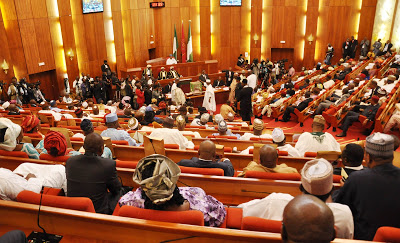
The Constitution has
vested in the National Assembly the power to make laws for the peace, order and
good governance of the Federation. The Assembly also has broad oversight
functions and is therefore empowered to establish committees of its members to
scrutinize bills and the conduct of government institutions and officials.
vested in the National Assembly the power to make laws for the peace, order and
good governance of the Federation. The Assembly also has broad oversight
functions and is therefore empowered to establish committees of its members to
scrutinize bills and the conduct of government institutions and officials.
The Constitution confers
exclusive powers to the Senate among them the power to scrutinize and confirm
major appointments of the executive. It is, however, specific about the
appointments to be confirmed. They are those of the Ministers, Special
Advisers, Ambassadors, top Judicial Officers heading specified levels of
courts, the Auditor-General of the Federation, and the Chairmen and Members of
the vital National Commissions.
The Senate is one of the
Chambers in Nigeria’s bicameral legislature, the National Assembly. The
National Assembly (NASS) is the nation’s highest legislature, whose power to
make laws is summarized in chapter one, section four of the 1999 Nigerian
Constitution.
Chambers in Nigeria’s bicameral legislature, the National Assembly. The
National Assembly (NASS) is the nation’s highest legislature, whose power to
make laws is summarized in chapter one, section four of the 1999 Nigerian
Constitution.
Sections 47-49 of the 1999
Constitution state inter alia that “There shall be a National Assembly
(NASS) for the federation which shall consist of two chambers: the Senate and
the House of Representatives”.
Constitution state inter alia that “There shall be a National Assembly
(NASS) for the federation which shall consist of two chambers: the Senate and
the House of Representatives”.
The Senate is headed by
the President of the Senate assisted by the Deputy President of the Senate.
These Presiding officers serve as political heads. There are one hundred and
nine (109) members in the Senate corresponding to the 109 senatorial districts
in the country. Senatorial Districts are evenly distributed among the thirty
six states. Each state has three senatorial districts while the Federal
Capital Territory (FCT), Abuja has just one senatorial district.
the President of the Senate assisted by the Deputy President of the Senate.
These Presiding officers serve as political heads. There are one hundred and
nine (109) members in the Senate corresponding to the 109 senatorial districts
in the country. Senatorial Districts are evenly distributed among the thirty
six states. Each state has three senatorial districts while the Federal
Capital Territory (FCT), Abuja has just one senatorial district.
Photo Credit – www.dgossip247.com
